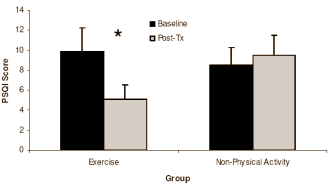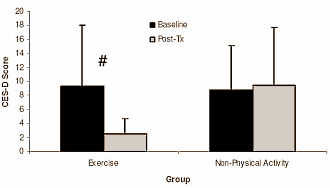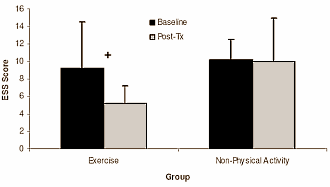|
Move more, sleep more (and better)
Over 55's with sleep problems will sleep better if they start running or jogging, according to the results of an experiment published by neurologists at Northwestern University, US, in Sleep Medicine. The researchers suggest that exercise not only increases the amount of sleep, but also improves the quality.
Sleep
People who get a lot of intensive exercise sleep more than people with a sedentary lifestyle. Exercise is an excellent remedy for sleep problems, according to meta-studies. [Sports Med. 1996 Apr;21(4):277-91.] For ninety percent of humanity, more and better sleep means more testosterone, a stronger immune system, improved stamina, quicker reactions, longer lifespan, less fat and more muscle.

As the population ages, scientists are showing increasing interest in the relationship between exercise and sleep. Aging is accompanied by sleep problems [Sleep. 1995 Jul;18(6):425-32.], so demand for ways and means of improving sleep is growing. Pharmaceuticals are not an option.
The Americans recruited 17 men and women over the age of 55 who slept less than 6.5 hours a day. Their average age was 62. All participants were given information on how they could improve their sleep by making behavioural changes. Think of advice along the lines of: don't drink espresso just before going to bed.
Study
One half of the group were taken to visit museums or given cookery lessons: this was the control group. The other half, the experimental group, went jogging or speed walking three times a week. The subjects gradually increased the length of their workouts, so that in the end the sessions lasted 30-40 minutes and the participants exercised at 75 percent of their maximal heart rate. At that intensity the subjects were just able (or not quite able) to have a conversation with each other. The experiment lasted 16 weeks.
Results
The participants in the experimental group said that by the end of the experiment they were sleeping an average of 85 minutes a day longer.
The researchers gave the subjects questionnaires to fill in before and after the 16 weeks. The PSQI questionnaire provided the researchers with information on the quality of sleep; the CESD list measured the extent of depression and the ESS list sleepiness during the day. The figures below show that the subjects started to sleep better, felt less depressed and were less tired during the day.



Conclusion
The subjects did not train very intensively; at the end of the 16 weeks their maximal oxygen uptake had not increased. Makes you wonder what would have happened if the subjects had done more intensive workouts.
Source:
Sleep Med. 2010 Oct;11(9):934-40.
More:
Sleep better - do strength training 24.05.2015
Burn more calories, sleep better 08.03.2013
Evening workout won't cost you sleep 02.02.2013
Archives:
Sleep
 |
 |
 |
|
Less sleep, less oxygen
Endurance athletes' performance declines if they've had three hours too little sleep the night before.
|
A warm shower in the evening improves your sleep
By improving sleep, training becomes more effective, athletes become faster, slimming attempts are more likely to succeed and the probability of a long and healthy life increases.
|
More sleep = less sugars in your diet
Imagine: you are a short sleeper and you normally sleep 5-7 hours a night. You are willing to boost that limited amount of sleep by changing your way of life.
|
|







